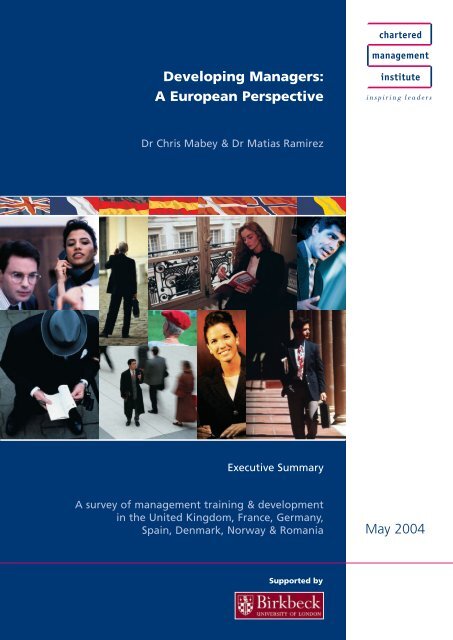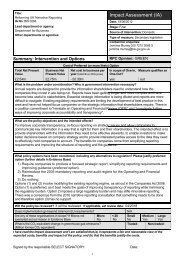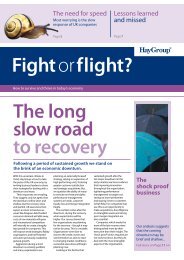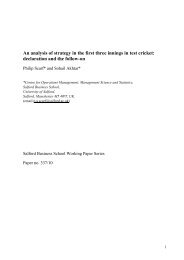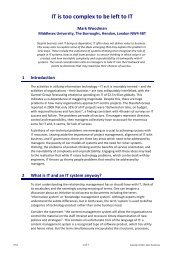Here - Management and Business Studies Portal - British Library
Here - Management and Business Studies Portal - British Library
Here - Management and Business Studies Portal - British Library
- No tags were found...
You also want an ePaper? Increase the reach of your titles
YUMPU automatically turns print PDFs into web optimized ePapers that Google loves.
Developing Managers:A European PerspectiveDr Chris Mabey & Dr Matias RamirezExecutive SummaryA survey of management training & developmentin the United Kingdom, France, Germany,Spain, Denmark, Norway & RomaniaMay 2004Supported by
CopyrightChartered <strong>Management</strong> Institute ©First published 2004Chartered <strong>Management</strong> Institute2 Savoy Court, Str<strong>and</strong>London WC2R 0EZAll rights reserved. Except for the quotation of shortpassages for the purposes of criticism <strong>and</strong> review,no part of this publication may be reproduced, storedin a retrieval system, or transmitted, in any formor by any means, electronic, mechanical, photocopying,recording or otherwise, without prior permissionof the publisher.This book is sold subject to the conditionthat it shall not by way of trade or otherwise,be lent, re-sold, hired out, or otherwise circulatedwithout the publisher’s prior consent in any formof binding or cover other than that in which it ispublished <strong>and</strong> without a similar condition beingimposed on the subsequent purchaser.<strong>British</strong> <strong>Library</strong> Cataloguing in Publication DataA CIP catalogue record for this report is available fromthe <strong>British</strong> <strong>Library</strong>ISBN 0-85946-331-1
IntroductionThis report addresses the question of how to create <strong>and</strong> sustain effectivemanagement from both a national <strong>and</strong> transnational perspective. The work buildson the methodology developed by the Chartered <strong>Management</strong> Institute’s researchseries “Achieving <strong>Management</strong> Excellence” that has been tracking trends inmanagement development in the UK since the 1980s.Birkbeck College, University of London led the project, with a team of partnersincluding the Institute <strong>and</strong> others from across seven European countries. It wascarried out with the support of the European Commission, the Leonardo da VinciCVTS Programme <strong>and</strong> the Department of Trade <strong>and</strong> Industry.ContextManagers are a highly influential employee category in terms of creating highperforming workplaces. Organisational capability at a management level isessential to improve competitiveness <strong>and</strong> the importance of managers isparticularly evident in the following respects:• Managers are typically the decision-makers with regard to seizingopportunities afforded by information <strong>and</strong> communication technologies• Managers are pivotal in how proactively <strong>and</strong> effectively change is managed• Managers are particularly instrumental in creating an organisational ethosof life-long learning for all groups of employees, especially thosetraditionally disadvantagedHowever, too often the training of managers is either neglected or an early casualtyof cost-cutting, because it is seen as a cost rather than an investment. Wheremanagement training is undertaken it is often non-strategic <strong>and</strong> piecemeal<strong>and</strong> rarely evaluated.This report therefore seeks to answer two specific research questions:1) Does management development make a difference toorganisational performance?2) Do approaches to management development differ accordingto sector, size <strong>and</strong> country?In most European countries, research into vocational education <strong>and</strong> training isgenerally less advanced than research into academic <strong>and</strong> technical education.The same is true for the training of managers. The intention of this study was tobuild on previous EC studies by providing an in-depth analysis of the kinds ofmanagement training systems, policies <strong>and</strong> practices adopted in Europe <strong>and</strong>the effects of these on organisational performance.Current data on what constitutes good workplace training practices in Europetends to focus on the quantity <strong>and</strong> types of training, but says little about how thequality <strong>and</strong> effects of this training <strong>and</strong> development. Although there have beenseveral country-specific studies into the impact of management education, thedevelopment of comparable studies across Europe remains largely absent.This research was driven by the need for a theoretically derived cross-nationalframework which guides training providers in the most effective traininginterventions in different sectoral <strong>and</strong> cultural settings.
Research MethodScopeThis report is based on a project researching management training <strong>and</strong>development systems in Europe which used a mixed-method approach(quantitative interviews <strong>and</strong> in-depth case studies).The first stage of the project involved 1400 telephone interviews in 700domestically-owned organisations across seven countries: Germany, Denmark,France, Spain, United Kingdom, Norway <strong>and</strong> Romania. Romania was chosenas an example of an emerging economy, typical of a country seeking future EUmembership. 100 interviews with HR managers <strong>and</strong> 100 line manager interviewswere conducted during 2002 in each country. From the 100 organisationsinterviewed in Stage 1, a number of firms were identified which claimed to beconducting a high amount of management development activity. Interviews wereconducted in 2003 with between three <strong>and</strong> six managers in each case organisation,the purpose being to explore in more depth their firsth<strong>and</strong> experience ofmanagement development from a participant perspective.SampleUsing local databases, contact was made by the research team with the HRmanager or equivalent, targeting only host-country owned companies <strong>and</strong> omittingpublic/not for profit organisations. Of the 1165 contacted, 701 agreed toparticipate, representing a response rate of 60 per cent (ranging from 50 per centin Germany to 78 per cent in the UK). The sector distribution across the totalsample was as follows:Manufacturing 34%Transport/distribution 21%Services (including financial 44%services, insurance, legal, business<strong>and</strong> management consultancy)All countries broadly mirrored this breakdown, with the exception of Germany wherethe services sector was over represented at the expense of transport <strong>and</strong> distribution.Given the focus of the study, which was structured management developmentactivities (formal or informal) initiated by the employer, it was decided to onlyinclude companies with 20 staff or more. The eventual sample achieved wasas follows:20-99 Small 25%100-249 Medium 24%250-499 Medium 22%500+ Large 28%Smaller firms were over-represented in Spain <strong>and</strong> Romania. In contrast,organisations employing more than 500 staff were over-represented in thehighly industrialised German sample, <strong>and</strong> to a less extent in Norway.Interviews lasted between 20-30 minutes for HR managers <strong>and</strong> a little less for linemanagers. Questions were asked about industrial <strong>and</strong> management structure, theorganisation’s management development strategy <strong>and</strong> policy, its preferred methods<strong>and</strong> practices for management <strong>and</strong> career development <strong>and</strong> mechanisms forevaluation. Line managers were interviewed about their firsth<strong>and</strong> experience oftraining <strong>and</strong> development, their views on the policies <strong>and</strong> practices adopted bytheir employer, together with an overall assessment of the effectiveness of thetraining provided.2
Key Findings <strong>and</strong> Conclusions1. Amount ofmanagementdevelopmentThere has been a pronounced increase in reported management developmentactivities (internal <strong>and</strong> external) across all countries since the early 1990s,with an annual increase from an average of 5.4 to 9.3 days per manager per year.On average Germany spends by far the most on developing its managers, followedby the Sc<strong>and</strong>inavian countries. Despite its training levy system, France comesfourth in this ‘league table’. Spain, UK <strong>and</strong> Romania come below the Europeanmean of 2513 Euros per manager per year. However, it should be noted thereis a great deal of variation by firms within countries.The primary trigger for investing in management development is changesin the external environment, closely followed by business need in one form oranother, with HR strategy ranked as third most important across the sevencountries. For Spain, the situation is quite different: both HR managers <strong>and</strong> linemanagers perceive individual dem<strong>and</strong> to be the pre-eminent trigger.Across all countries, more tactical, supply-driven factors still account for36 per cent of management development activity.Where management development is constrained, this is caused less by lack ofsupport/enthusiasm <strong>and</strong> more by practical/logistical difficulties; this is a consistentpicture for all countries, except Spain. The situation is particularly difficult inSpain where both logistics <strong>and</strong> attitudes appear to be weighing heavily againstsuch investment.2. Ways ofdevelopingmanagersHR <strong>and</strong> line managers were in agreement about the top three methods fordeveloping managers across all countries: internal skills training programmeswere the most favoured method across all countries, followed by external publiccourses, seminars <strong>and</strong> conferences; with mentoring/coaching in third place.Both Denmark <strong>and</strong> UK report a far higher use of qualifications-basedmanagement development than the average in Europe.As yet, little use is made of e-learning <strong>and</strong> it is ranked as the least favouredapproach by both HR <strong>and</strong> line managers.Spain <strong>and</strong> France place a heavy reliance on internal, <strong>and</strong> very little on external,approaches; the converse is true for Denmark (where public provision ofmanagement training by the Government is both extensive <strong>and</strong> highly subsidised),for Norway <strong>and</strong> the UK.3
3. <strong>Management</strong>development policy<strong>and</strong> systemsThe majority of organisations (61 per cent) claim to have a specific budget forstaff training generally, the exceptions being Denmark where this is true foronly half the companies <strong>and</strong> Spain where the figure is only 25 per cent.HR managers in less than half of the organisations in the survey claimed to havea management development policy statement, although the proportionincreases to two-thirds for Norway <strong>and</strong> Romania.When it comes to the systems <strong>and</strong> practices in place to facilitate managementdevelopment (such as appraisals, career planning, fast-tracking <strong>and</strong> evaluation),Spain is the poor relation, with significantly less in the way of developmentpractices than all other countries, except France.Over half (56 per cent) of all companies use fast-track managementdevelopment for selected managers. This approach is particularly favoured inFrance (77 per cent), Norway (71 per cent) <strong>and</strong> Germany (67 per cent).Appraisals are widely used for managers in Europe (62 per cent), <strong>and</strong> of these,59 per cent claim that development needs are discussed at appraisals. The figuresfor France <strong>and</strong> the UK are far above the average.Line managers claim career planning takes place in 55 per cent of organisations(compared with HR managers who claim 60 per cent), but there is a wide variationfor two countries: Denmark (88 per cent) <strong>and</strong> the UK (31 per cent).4. <strong>Business</strong> <strong>and</strong>HR strategyWhile most organisations had a clear business strategy, it seems the HRcontribution to such strategies is moderate at best. There is reasonable supportfor the view that HR management delivers competitive advantage, UK <strong>and</strong> Francecome out lowest. Indeed, France <strong>and</strong> UK are generally more adrift from the othercountries, perhaps revealing a scepticism about the strategic contribution ofHR management.UK <strong>and</strong> French organisations are significantly less likely to adopt a strategicapproach to HR management: typically their HR specialists will have a lessstrategic role <strong>and</strong> the link between HR <strong>and</strong> business strategies will be lessevident than their European counterparts.5. Evaluation ofmanagementdevelopmentAround four in ten (41 per cent) of HR managers (compared with 37 per cent ofline managers), claim that management development activities are evaluatedin a systematic way.By far the most favoured method, accounting for more than a third of all mentionson average, was reference to other business measures such as productivityindices, sales targets, innovation, customer satisfaction, profit <strong>and</strong> turnover,balanced scorecard <strong>and</strong> other efficiency measures. Presumably such measureswere already in place in the organisation <strong>and</strong> evaluation was undertaken bylinking management development activity with improvement in these indices.Some way behind, but still mentioned by 17 per cent of respondents on averageacross all countries, was the use of structured <strong>and</strong> informal feedback.4
<strong>Here</strong> the measures had more of an HR (as against a straightforward business)focus. They included everything from formal mechanisms such as feedbackinterviews with participant managers, through to more anecdotal measures suchas “listening to the language to see if management development has made animpression”. For Norway, these informal ways of measuring the impact ofmanagement development were by far the most popular (33 per cent of mentions).Nearly a fifth (19 per cent) of replies across the seven countries on average,were to the effect that no evaluation was conducted at all. This was accentuatedin France <strong>and</strong> the UK where 32 per cent <strong>and</strong> 27 per cent of all mentions werein this category.6. Impact ofmanagementdevelopment onorganisationalperformanceCompanies were asked how successful their management developmentactivities were in developing managers to meet their needs <strong>and</strong> how positive theimpact of management development had been on the organisation over thepast three years. Although the differences are slight, France <strong>and</strong> the UK registerleast favourably on both measures; Norway <strong>and</strong> Romania are rated most highly onsuccess, <strong>and</strong> Germany <strong>and</strong> Romania most highly on impact.There is strong statistical evidence that management development leads tosuperior organisational performance across companies of all sizes, sectors<strong>and</strong> national location. An impressive 16 per cent of variance in performance isexplained by three factors: the extent to which HR is integrated with businessstrategy, the degree to which the firm takes a thoughtful, long-term approach todeveloping managerial capability <strong>and</strong> the belief by line managers that theiremployer is taking management development seriously.This is not to say that management development ‘best-practices’(such as appraisal, fast-tracking, career planning) <strong>and</strong> greater managementdevelopment provision (the amount <strong>and</strong> a range of informal <strong>and</strong> formal methodsused by a firm to develop managers) are not desirable; rather that these factorswill not differentiate high from low performers.7. <strong>Management</strong>development ethos<strong>Management</strong> development ethos describes the degree to which organisations takea thoughtful, long-term <strong>and</strong> consistent approach to the creation of amanagement cadre. On this measure Spanish companies are again significantlyless likely to adopt this stance compared to all other countries except France,where the score is also low but not significantly different to the other countries.Firms in Germany, Romania <strong>and</strong>, to a lesser extent, the Sc<strong>and</strong>inavian countries,are better at fostering their internal labour markets through promotion <strong>and</strong>retention of managers. The approach in Spain, <strong>and</strong> to some extent in France,appears to be much more instrumental. Firms in the UK are located somewherebetween these two extremes.5
Summary of country findingsCountry Type Key features Strong points ChallengesUnited Kingdom Generalist <strong>and</strong> reliant Comparatively weak Significant progress Lack of continuity in(UK) on externally career structures. since mid-1980s in national policy frameworks.accredited vocational Training objectives amount of Employer approach totraining or education clarified by use of development development often shortcompetences<strong>and</strong> undertaken term, tokenistic <strong>and</strong>appraisalsnon-strategicFrance Decisive vocational Law requires firms to High st<strong>and</strong>ard of Training levy no guarantee(Fr) educational spend at least 1.2 Gr<strong>and</strong>s Ecole of strategic approach toinstitutions per cent of wage bill education with developmenton trainingorigins <strong>and</strong> closeFormal internalproximity tocareer structuresbusiness worldGermany In-house High proportion of Strong emphasis on Need to encourage(Ger) CEOs hold PhDs technical education greater flexibility<strong>and</strong> individual loyalty <strong>and</strong> diversity ofEmphasis on formal to their employer managerial skillsrather than informalstructures fordevelopmentSpain Limited to large Large number of SMEs Has become Extending(Sp) corporations <strong>and</strong> family owned systematised in managementbusinesses has successful large development to therestricted growth of corporations broader SMEprofessionalcommunitymanagerial classDenmark Combines general, Experiential learning Open to new practices Weak formal or(Den) vocational <strong>and</strong> systematic attempts"on-the-job" training Emphasis on informal Public training to evaluate the impact ofmanagement institutions with management developmentdevelopment high status on performanceCombinesegalitarianism withentrepreneuralismNorway Emphasis on company Egalitarian <strong>and</strong> Widespread Combining its(Nor) <strong>and</strong> vocational training communitarian ethos expectation by egalitarianism with themanagers that they need to encourage greaterLimited individual will receive training individual entrepreneurship,rewards for <strong>and</strong> development innovation <strong>and</strong> riskperformance <strong>and</strong> positive view of managementits outcomesRomania External Content heavily Many managers Complementing external(Rom) influenced by external benefiting from EU training with indigenousorganisations <strong>and</strong> sponsored up-to-date training to build necessaryagencies know-how through competenciesmanagementdevelopment6
RecommendationsHR connectionshould be throughpartnership, not justa presence• Those representing HR <strong>and</strong> management development in their organisationsneed to be assertive in interpreting business priorities <strong>and</strong> in translating theseinto well resourced <strong>and</strong> well understood policies <strong>and</strong> practices.• HR specialists should also ensure that the improvements in motivation,performance <strong>and</strong> productivity are reported back at Board level to increasechances of further resourcing.• There is also a key role for HR departments to play in systematically evaluating<strong>and</strong> following up on management development activities. This will helpunderline to line managers the organisational commitment to implementingnew practices.Create a managementethos as well asdeveloping systems• <strong>Management</strong> development systems need to be put in place but while thisinfrastructure (formal policies, specific budgets) is necessary, it is not sufficientto improve management performance.• For most firms the ingenuity, loyalty <strong>and</strong> commitment of their management teamis what gives them competitive edge. Organisations that take a thoughtful longtermapproach to the creation of a management cadre will perform better thanothers in their sector <strong>and</strong> be more productive.• Employers need to be proactive in cultivating managerial talent at all levels inthe organisation <strong>and</strong> in developing future potential rather than just forimmediate requirements.• Wherever possible introduce appropriate cultural changes to support theoutcome of management development activities, especially where the intendedresults are attitudinal.A shared <strong>and</strong>credible agenda• Too often the views of those on the receiving end of HR initiatives are minimisedor overlooked. Those responsible for implementation should also work hard toensure that line managers underst<strong>and</strong> the strategic intent of developmentundertaken, that promises are fulfiled <strong>and</strong> that fads <strong>and</strong> fashions are resisted.• Performance <strong>and</strong> productivity is enhanced when line managers see their seniormanagement team giving management development sustained priority <strong>and</strong> whenthey see its link to a consistent set of organisational skills <strong>and</strong> competencies.• There needs to be a sense of realism about how management development may,or may not, impact on personal advancement <strong>and</strong> career progression.7
AcknowledgementsThe findings of this report arise from a study funded by the European CommissionLeonardo da Vinci Procedure C, Ref RF 81505 <strong>and</strong> with additional support fromthe Department of Trade <strong>and</strong> Industry.This report has been prepared by Chris Mabey <strong>and</strong> Matias Ramirez. Chris Mabey isReader in Organisational Psychology at Birkbeck College, University of London,where he teaches Human Resource <strong>Management</strong> on the Masters programmes. Forthe past three years he has led an international network of researchers exploringmanagement development policy <strong>and</strong> practice in Europe. Matias Ramirez is alecturer at the Brunel School of <strong>Business</strong> <strong>and</strong> <strong>Management</strong>, Brunel University,where he teaches <strong>Management</strong> of Innovation <strong>and</strong> Technology <strong>and</strong> knowledgemanagement. His main interests are cross country comparisons of managementtraining <strong>and</strong> development <strong>and</strong> the relationship between work organisation <strong>and</strong>innovation in firms.The Chartered <strong>Management</strong> Institute has been the dissemination partner throughoutthe two-year study <strong>and</strong> the authors would like to thank Gene Crozier, Petra Cook,Karen Charlesworth <strong>and</strong> Nick Parker, for their contribution to this project.The authors would particularly like to thank Dr Colin Gray, Open University<strong>Business</strong> School, for his specialist contribution throughout the project on the SMEdimension; also to Jo Wilkie for help with the project in the early stages, to SusanMoseley <strong>and</strong> Jenny Kidd for assisting with the case studies in the UK; <strong>and</strong> to TimFinch-Lees for his editorial work on all 72 case studies.However, this report would not have been possible without the collaboration of allthe European partners involved in the “Developing Managers in Europe:A Report for the European Commission” including:France• Jonathan Winterton, Francoise Delamare Deist, Alain Klarsfeld, CelineLafoucriere - ESC TouloseGermany• Uwe Seebacher, Verena Pabst - USP Consulting, Munich, GermanySpain• Marta Solorzana - University of Distance Learning, MadridDenmark• Henrik Larson, Anne-Mette Hjalager - Copenhagen <strong>Business</strong> SchoolNorway• Paul Gooderham, Bjarne Espedal, Birthe Lange – Norwegian School ofEconomics <strong>and</strong> <strong>Business</strong> AdministrationRomania• Renaldo Nita, Camelia Petrescu, CODECS, Bucharest8
The leading organisation for professional managementAs the champion of management, the Chartered <strong>Management</strong> Institute shapes <strong>and</strong>supports the managers of tomorrow. By sharing the latest insights <strong>and</strong> settingst<strong>and</strong>ards in management development, we help to deliver results in a dynamic world.Encouraging management development,improving business performanceThe Institute offers a wide range of development programmes, qualifications,information resources, networking events <strong>and</strong> career guidance services to helpmanagers <strong>and</strong> organisations meet new challenges in a fast-changing environment.Shaping future management practiceWith in-depth research <strong>and</strong> regular policy surveys of its 74,000 individual members<strong>and</strong> 480 corporate members, the Chartered <strong>Management</strong> Institute uses its deepunderst<strong>and</strong>ing of the key issues to improve management performance.For more information contact:The Public Affairs Department, Chartered <strong>Management</strong> Institute2 Savoy Court, Str<strong>and</strong>, London WC2R 0EZTel: 020 7421 2704 Fax: 020 7497 0463email: research@managers.org.uk website: www.managers.org.ukFor further details about this project visit:www.managers.org.uk/euromanagementdevelopmentReach 11074 - 05/04Incorporated by Royal Charter Registered charity No. 1091035


